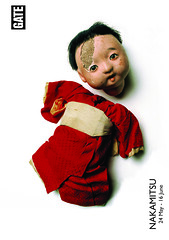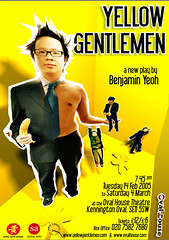Recommending
Under the Blue Sky. David Eldridge play. I know David, although not very well and he was a great blogger before he closed his blog. His play is many faceted, but I like it as 3 connecting love stories, which I think, in the end, affirm life. And if you take away from the theatre more than you began with, then that has to be worth seeing. Interview in Indy here.
Stars in the Morning Sky. At the Riverside Studios. I’ve not seen it but a friend is in it and could be worth a trek West London.
…some trace of her at the National Theatre. I like Katie Mitchell’s work and Hattie Morahan is a friend. I wonder how the mise-en-scene has developed since Attempts on her Life… suggestion from the Whingers, maybe not that much.
Both Kung-Fu Panda and Wall-E. I love animation in all its forms and these are two – different – but hugely enjoyable films for all ages. You will learn about the Wuxi finger hold in Kung-Fu Panda and be charmed by robots in the other!
On the home front: I’ve now had several portions of home grown french beans and courgettes. Courgettes particularly are easy to grow, so if you have any outside patch I say plant one in a pot next year. If you only have indoor space then I recommend radishes.
Festivals
There is an atmosphere of shared experience at festivals that theatre only occasionally matches. I thought this while watching Beck at the recent Hyde Park festival.
To be fair, theatre makers probably do not always wish to engender this experience. Punchdrunk in eg Masque of the Red Death encourage you to create your own adventures and story throughout the evening.
Festivals do this too with the easier ‘framing device’ of live bands!
I wonder if groundling crowds at the Globe Theatre in Shakespeare’s time or watching a hanging brought humans together in this way, historically.
What place now football matches? There’s an amazing shared experience for fans in that – even rival ones.
Human development
As an analyst I’m always intrigued by measures of “value”.
Investors will pay different multiples on the profits of different companies, depending on the risk/reward prospects.
Higher profits one year does not necessarily mean a higher value for investors for all myriad of reasons.
Therefore, I find this human development index – HDI – fascinating.
It shows that while the US is the richest country overall in terms of, say, absolute GDP. It is not by some way the best in measures that could be claimed to measure human development (and by proxy perhaps, happiness?) such as life expectancy and infant mortality.
In the words of Nobel laureate economist Amartya Sen, who developed the HDI in 1990: “Human development is concerned with what I take to be the basic development idea: namely, advancing the richness of human life, rather than the richness of the economy in which human beings live, which is only a part of it”
Recent Exploits
Recent exploits include
Dressing up as a fairy godmother
Researching where Counter’s Creek starts and runs in London. It’s a “lost” river.
Finding a copy of the Worm Scrubs Act 1879 (still in force but not available on the internet. Thank you Guildhall library). Editing the wiki on it to reflect my reading. Thinking about use of vacant urban spaces. Like here. Pic.
Seeing Blackwatch for second time. Excellent. Still excellent.
Seeing …Sisters. Sadly, only once.
Being rejected by Radio 4. Basically because of the economy. Not that R4 has run out of funds, but more because my story heavily involved the City and the economy.
Making a Freedom of Information Act request. One of the best UK legislations in the last 50 years.
Thinking about GLP-1 analogues and diabetes.
Trying out Hix Chop house and Portal restaurants. Both good but expensive if you’re paying.
Watching my beans and courgettes grow and getting distressed by mould and slugs; and the neighbours’ cats constantly pooing in the garden. Ugh.
Creative Capitalism: Bill Gates
I think some of this philosophy applies to funding and benefits from creative arts, which are generally intangible in nature; although Gates’ main focus are more basic necessities such as clean water, enough food or Malaria prevention.
From his 2008 Davos Speech:
“… I like to call this new system creative capitalism – an approach where governments, businesses, and nonprofits work together to stretch the reach of market forces so that more people can make a profit, or gain recognition, doing work that eases the world’s inequities.
Some people might object to this kind of “market-based social change” – arguing that if we combine sentiment with self-interest, we will not expand the reach of the market, but reduce it. Yet Adam Smith – the father of capitalism and the author of Wealth of Nations, who believed strongly in the value of self-interest for society – opened his first book with the following lines:
“How selfish soever man may be supposed, there are evidently some principles in his nature, which interest him in the fortunes of others, and render their happiness necessary to him, though he derives nothing from it, except the pleasure of seeing it.”
Creative capitalism takes this interest in the fortunes of others and ties it to our interest in our own fortunes – in ways that help advance both. This hybrid engine of self-interest and concern for others serves a much wider circle of people than can be reached by self-interest or caring alone…”
Lyn Gardner back to school
Gardner back to school….
“…In my day, it was just accepted that theatre was part of school life. Every summer term, each class would participate in the drama competition, putting on a play from scratch. By the time I’d left St Anne’s, I had been involved in devising, writing, directing, designing, acting in and stage-managing seven plays, with almost no adult input. I wouldn’t be doing the job I do today without that experience. Mrs Martin says, sorrowfully, that today this would be impossible. “There are too many exams, not just in the summer but throughout the year. There just wouldn’t be the time.”
So the Coloma girls end up creating performance and theatre not for the sake of it, not because they really want to, but because it can be marked and graded, in what seems to be the GCSE equivalent of Pop Idol. As I take my leave, I can’t help thinking the girls aren’t as fortunate as I was – at school in a time before endless tests and league tables, when we could spend our days spouting poetry, putting on plays and seeing as much theatre as we could afford for the sheer pleasure of it. It was great fun. Little did I know how useful it would be.”

